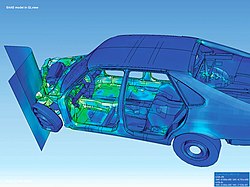This two-year Master (3 semesters & 1 internship semester), totally taught in English, aims at preparing students for a professional career with a broad knowledge of automotive engineering adapted to the new trends (hybrid propulsion, electrical vehicle, fleet management…) while offering specialisations central to the industry & research to meet these requirements. At Brunel we provide many opportunities and experiences within your degree programme and beyond – work-based learning, professional support services, volunteering, mentoring, sports, arts, clubs, societies, and much, much more – and we encourage you to make the most of them, so that you can make the most of yourself.
The app provides quick revision and reference to the important topics like a detailed flash card notes, it makes it easy & useful for the student or a professional to cover the course syllabus quickly before an exams or interview for jobs. Department of Automotive Engineering has been continuing its education in the new Engineering Faculty building which is about 7700 m2 and fully air-conditioned for the comforts of the students as well as academic and administrative staff. In order to keep up, the automotive industry needs highly educated young professionals across the globe. Your team specifies, designs, constructs, manufactures, tests and commissions an engineering system, product or process.
This program is fully accredited by the Canadian Engineering Accreditation Board (CEAB), ensuring you have met the academic qualifications necessary for registration as a licensed professional engineer in Canada when you graduate. You will have the management skills, technical awareness, and vision to assess different technology options within the context of environmental legislation and consumer expectations for vehicle quality, reliability, and performance. You will gain an understanding of the commercial, legal, ethical and environmental factors associated with automotive engineering.
The MEng Group Project involves 3-6 students of different engineering disciplines forming a team. This module aims to address the current and future demand for engineers in the automotive sector to have a holistic understanding of vehicles as systems which deliver a range of capabilities from transport to safety to information to entertainment. Many Brunel graduates are currently working in key technical and managerial positions within the automotive industry. Outline the historical development of ‘quality’ and assess application of quality tools and techniques in engineering.
The aim of the Automotive Engineering Department is to prepare engineering candidates for various branches of industry with an improved self-confidence and individual initiative. The design part of the module will develop skills in engineering drawings and computer aided design (CAD) and solid modelling together with an introduction to the fundamentals of material science. An engineering degree is essential; further education in mechanical engineering is necessary for progression in the field. A solid mathematical and scientific background necessary to comprehend the fundamentals of engineering. To achieve the required depth within automotive engineering, students must choose four extra courses. As you progress, you will study automotive manufacturing, engine systems, vehicle dynamics, materials and structures, and safety.
